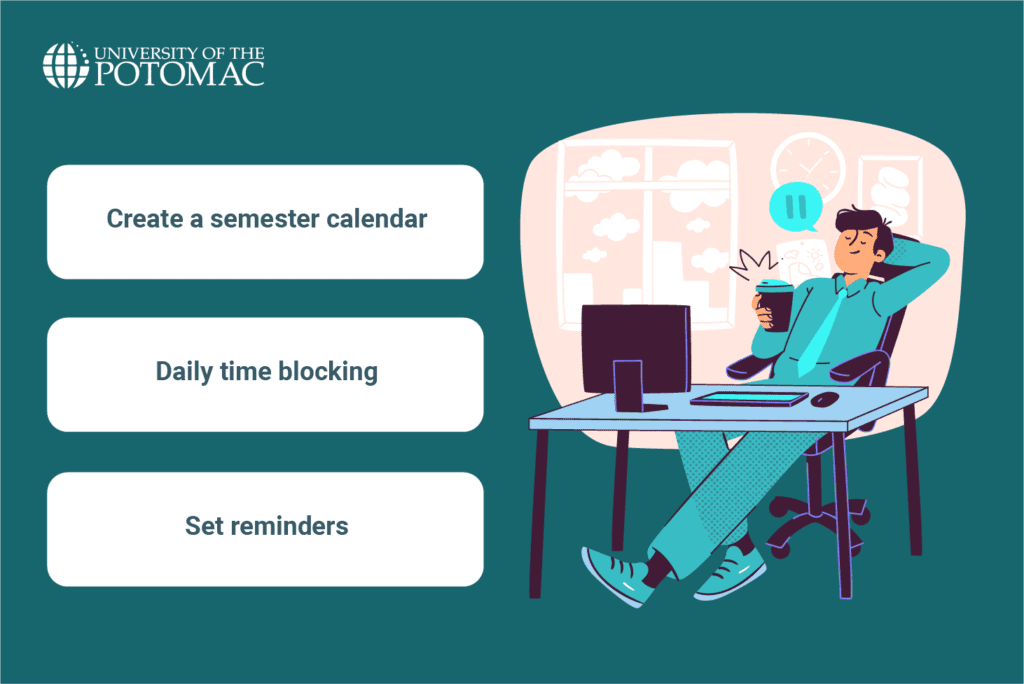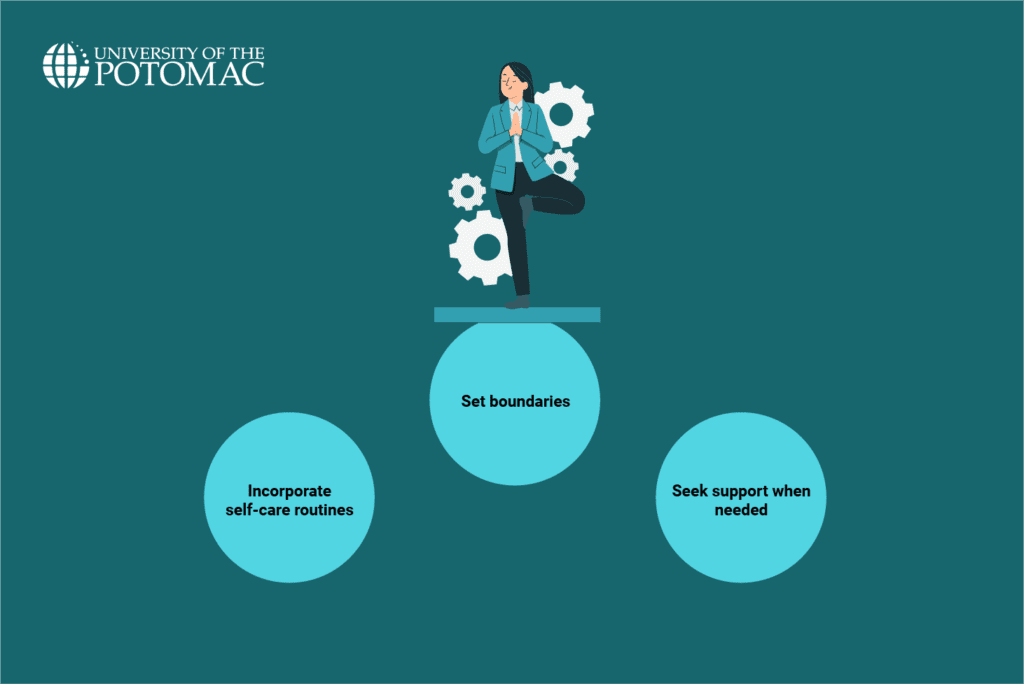Are you wondering what you can do today to make your college schedule easier for yourself? Continue reading and discover some of the most effective strategies on how to stay organized in college!
While college life can be some of the most exciting years of your life, it can often be overwhelming due to the myriad of assignments and tasks it entails. You have to balance classes, extracurricular activities, and assignments while maintaining a social life. But there’s no reason to worry, as by mastering some practical strategies, you can stay on top of your assignments and make the most out of your college experience.
So, how can you stay organized in college?
Join us as we explore seven practical tips to help you stay organized in your college years. From mastering time management to effectively managing assignments and projects and maintaining a balanced lifestyle, we’ve got you covered. Let’s dive right in!
Strategies on How to Stay Organized in College
The right strategies and tools can help you become an organized college student throughout the semester. Here are some practical tips you can implement to stay on top of your tasks and maintain a balanced college life.
1. Master Your Time Management

Time management is crucial in college. It allows you to set specific time slots for various tasks so you can be ahead of deadlines. Time management also enhances focus and productivity and gives you time for leisure activities.
To master time management skills, you can:
- Create a semester calendar to mark dates like exams, project deadlines, and breaks
- Utilize time blocking to allocate specific time slots for classes, study sessions, and relaxation
- Set reminders on calendar alerts and app notifications to keep track of assignments and homework
2. Leverage Technology for Organization
Whether you use organizational apps to manage your tasks or digitize your notes, the right technology tools can complement your organizational style and workflow. Here are some ways you can leverage technology for your organization system.
- Use Organizational Apps: Organizational apps are excellent tools for managing tasks, as well as meeting deadlines, assignments, and other life obligations. For example, you can use apps like Notion, Todoist, or Trello for task management.
- Digitize Your Notes: Maintaining a good note-taking system makes studying for exams easier and more efficient. Moreover, having digital notes allows you to access your notes without needing to keep track of stray papers and notebooks. Utilize apps like Evernote or Google Keep for easy access and organization.
- Back-up Important Documents: Consider making two copies of all your digital and hard-copy work so that you can stay organized even if documents go missing or become unavailable. You can utilize cloud storage such as Google Drive or Dropbox for safety and accessibility.
3. Implement Effective Study Habits
Another strategy that helps you stay organized is implementing effective study habits. Some of the ways you can do so include:
- Establish a Study Schedule: Create a realistic schedule that you can stick to. This schedule should include specific days or times of the day each week for studying different subjects. For example, if you’re not a night person, don’t schedule study sessions at night; try to study during the day during breaks between classes.
- Use Active Learning Techniques: Active learning techniques help you cognitively engage and interact with the material you’re learning. Some of these effective techniques include summarization, self-quizzing, and teaching others.
- Break-Up Study Sessions: To make the most of your study sessions, you can implement the tried-and-true Pomodoro technique, which helps you maintain focus and retention. This technique involves setting a timer for 25 to 50 minutes and then taking a five- to 10-minute break.
4. Organize Your Physical and Digital Spaces
A cluttered space can lead to a cluttered mind. Therefore, organizing your physical and digital spaces can make it easier to focus on your assignments. Some ways you can declutter and organize your physical and digital spaces include:
- Create a Dedicated Study Area: Your study area significantly affects your productivity and focus. Therefore, create a dedicated study space that is clutter-free, clean, and free from distractions.
- Declutter Regularly: Set time aside each week to remove unnecessary items from your study space. A tidy study area helps you concentrate on your studies and create a more pleasant living environment.
- Organize Digital Files: Since college often involves working on laptops, digital organization is crucial. Organize your files into folders, use digital calendars and organizational apps, and back up important documents regularly. You should also create folders and subfolders for different classes and projects.
5. Efficiently Manage Assignments and Projects
We know that effectively managing assignments and projects is perhaps essential to staying organized in college. But what are some of the ways you can do so?
- Break Down Tasks into Manageable Steps: Looking at an assignment as a whole can be overwhelming. For larger projects, outline steps and set mini-deadlines to stay on schedule and motivated to move forward.
- Utilize Task Management Systems: Feeling accomplished after completing a task can help you stay motivated and productive. You can use Kanban boards or simple to-do lists to track your progress toward your objectives.
- Prioritize Tasks: When facing a mountain of assignments from all your classes, it’s easy to be overwhelmed and unsure where to start. Hack this using the Eisenhower Matrix to distinguish between urgent and important tasks.
6. Maintain a Balanced Lifestyle

Organization doesn’t involve only academic routines but also how you organize your everyday life. Some of the things you can do to maintain a balanced lifestyle include:
Interested in pursuing a degree?
Fill out the form and get all admission information you need regarding your chosen program.
This will only take a moment.
Message Received!
Thank you for reaching out to us. We will review your message and get right back to you within 24 hours.
If there is an urgent matter and you need to speak to someone immediately you can call at the following phone number:
- We value your privacy.
- Incorporate Self-Care Routines: Self-care can be any activity that helps you prioritize your physical and emotional well-being, such as physical activity, consistent sleep, and a nutritious diet. These activities can help you process emotions and combat stress while fueling your brain.
- Set Boundaries: While studying is crucial, balance is key. So, make time to spend on things you enjoy, such as spending time with friends, reading a book, or going for a walk.
- Seek Support When Needed: Staying organized doesn’t mean pushing yourself to the limit. If you find yourself struggling, reach out to academic advisors or counselors. They can provide valuable guidance and support to help you navigate challenges.
7. Reflect and Adapt
Flexibility is critical to maintaining your organization system. You should reflect and adjust accordingly to optimize your productivity and effectiveness. To do so:
- Set aside time each week to review what worked and what needs improvement
- Be willing to change your organizational methods as needed
- Acknowledge your accomplishments no matter how small to stay motivated
Why Staying Organized Is Essential for College Success
In college, you’ll have to keep track of many things, and developing an organization system can help you better manage your time. Staying organized also helps you prepare for a future career in just about any industry.
Other advantages that make staying organized in college critical include:
- Increased Productivity: Staying organized makes it easier to keep track of assignments and projects. Moreover, it helps you focus on what you need to do so that you can get more done in less time.
- Reduced Stress: Developing a plan and sticking to it helps you complete your assignments and gives you more time for the things you enjoy. This way, you can reduce stress and feel control over your life.
- Academic Success: Implementing organization strategies allows you to complete your assignments on time, attend all important classes, and create efficient exam prep plans. These routines help you allocate more time to study for exams, which leads to better grades.
- Enhanced Self-Esteem: Getting organized is a great way to regain control of your schedule and allow you to be more mindful about your time. Moreover, taking on this responsibility and meeting your objectives and goals, in turn, boosts your confidence.
Conclusion
Implementing organizational strategies such as time management, effective study habits, a balanced lifestyle, etc., can help you not only in your college years but also in your future career. These strategies help reduce stress, increase productivity, enhance self-esteem, and improve grades.
Now that you know the key to staying organized in college, you’re one step closer to starting your academic journey. But what do you need to do next? Check out our bachelor’s degree program offerings that give you a competitive edge in the marketplace. Let the journey begin!
Frequently Asked Questions (FAQs):
What should I do if I feel overwhelmed with my organizational system?
If you get overwhelmed by your organizational system, start by organizing one week at a time and implementing a few strategies. Once you get the hang of it, you can organize more weeks ahead.
How do I keep track of multiple assignments and deadlines?
Some options to keep track of multiple assignments and deadlines include:
- Physical planners
- Google calendars
- Notion/Evernote/OneNote
- To-do lists
- Syllabus organization
What are some quick tips for a clean study area?
With a few quick tips to declutter your study area, you can create an efficient workspace that can help your productivity. Tips for a clean study area include:
- Sorting your things into categories such as documents, personal items, office supplies, and electronics
- Tidy your desk at the end of each workday
- Scan important documents and store them digitally to free up physical space
What should I do if my organizational methods aren’t working?
Remember that organization looks different for different people. So, if your organizational methods aren’t working, take a step back and assess what you should adapt to work best for you.










